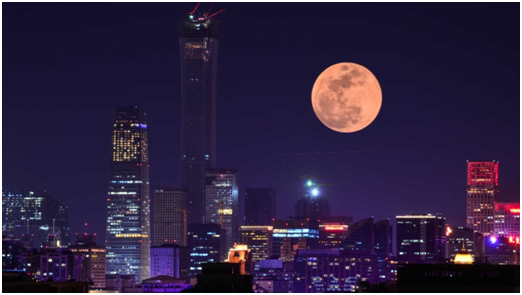

- Chinese scientists are planning to launch an artificial moon into orbit by 2020 to illuminate city streets after dark.
- Scientists are hoping to hang the man-made moon above the city of Chengdu, the capital of China’s south-western Sichuan province.
Context
- Chinese scientists are planning to launch an artificial moon into orbit by 2020 to illuminate city streets after dark.
- Scientists are hoping to hang the man-made moon above the city of Chengdu, the capital of China’s south-western Sichuan province.
About
- The imitation celestial body — essentially an illuminated satellite — will bear a reflective coating (similar to how the moon shines) to cast sunlight back to Earth, where it will supplement streetlights at night.
- Scientists estimated that the "illumination satellites" could be eight times more luminous than the actual, original moon and will shine in tandem with the real moon.

- The illuminated satellite is designed to complement the moon at night. Its expected brightness, in the eyes of humans, will be around one-fifth of normal streetlights.
- It will orbit much closer to Earth; about 500 km (310 miles) away, compared to the moon’s 380,000 km (236,000 miles) and light up an area with a diameter of 10 to 80 kilometres.
- The satellites’ brightness and service time are both adjustable, and the accuracy of the lighting can be controlled within tens of metres.
- If the project proves successful, it could be joined by three more additions to the night sky in 2022.
- The three artificial moons would operate alternately in order to significantly reduce infrastructural electricity consumption, especially during winter.
- China’s space experiment is not a first of its kind project. In the 1990s, Russia experimented with using an orbital mirror to reflect sunlight on some of its sun-deprived northern cities. However, the project was abandoned in 1999 after the mirror failed to unfold and was incinerated in the atmosphere.
- In January, American firm Rocket Lab launched an artificial star into space. But scientists criticized the “Humanity Star,” as the reflective mini-satellite was dubbed, for contributing to artificial light pollution and cluttering in Earth’s orbit.
Significance
- It is estimated that new moons could save the city of Chengdu around 1.2 billion Yuan ($173 million) in electricity costs annually, and could even assist first responders during blackouts and natural disasters such as earthquakes and floods.
- According to the experts, much more testing needs to be done to ensure the plan is viable and will not have a detrimental effect on the natural environment.


